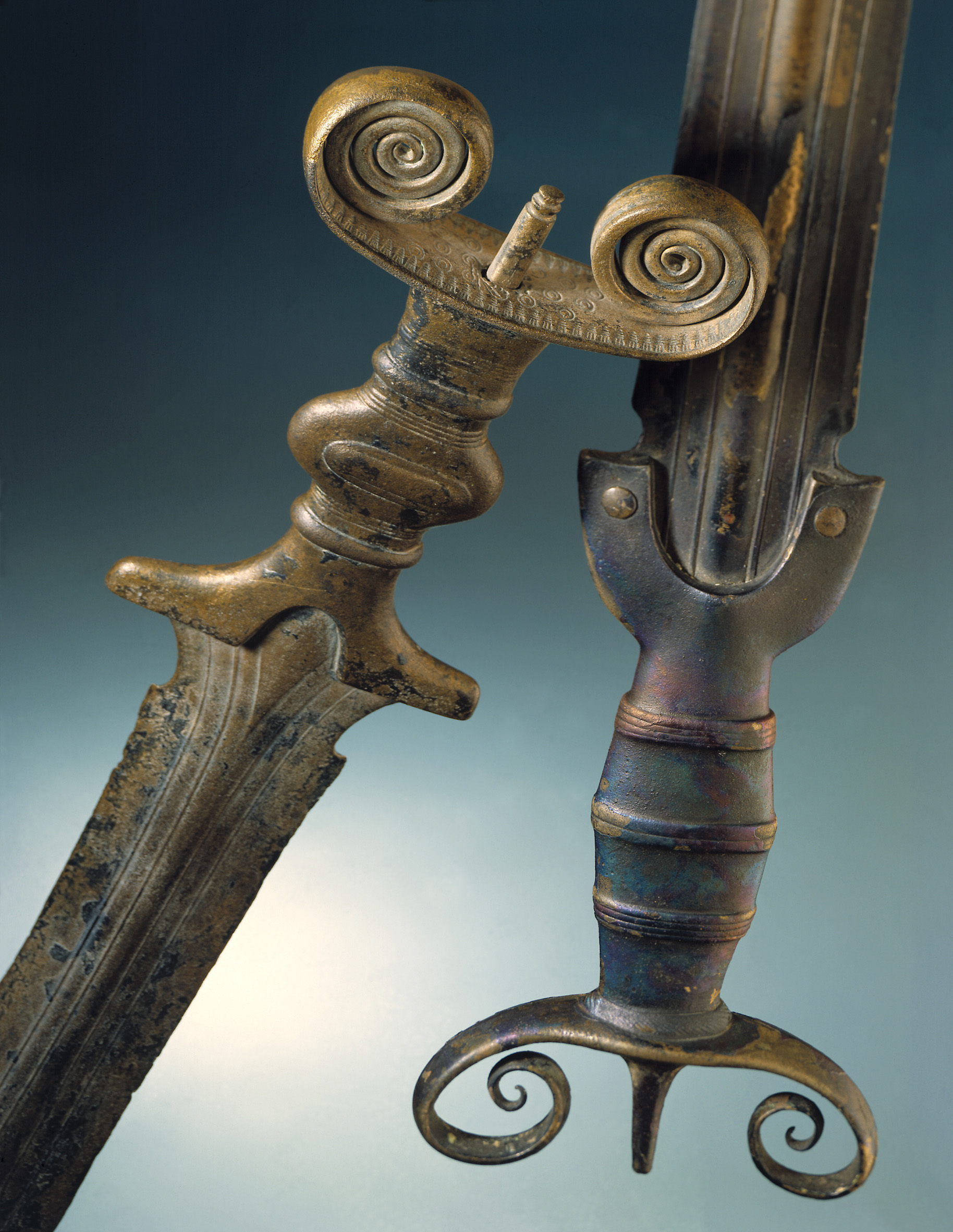 |
| (One of mine is here ...) |
It is a curiosity of antiquity/Late Antiquity, that there were major populations (to use the term “nation” calls to mind too many modern notions to be useful or worthwhile) who took their names from weaponry.
The ultimate derivation of the name now pronounced "Franks" is their throwing-ax, the francisca – which, interestingly enough, seems to bear a fundamental kinship also with their word for liberty (again, “freedom” is the wrong word, evoking certain specifics beside the point of what was meant in ancient context).
The Saxons, too, took their name from a blade, the
seax, which was more a dagger than an ax – but equally as much a part of daily life as the Franks’ tool of choice.
Digging (perhaps with a pickax) farther back, we find the labris, the ancient Minoan double-headed ax, which gave its name not to a people, but to that classically enshrined place, and concept, the labyrinth: “the place of the ax”. There is an archaeological site in Turkey, the city of Labraunda, whose name also seems to derive from that of the weapon.
For some of us (though hardly for all) today, the idea of imbuing a weapon with spirit – indeed, with the spirit of an entire people (or a people’s being imbued with the spirit of a weapon) – is perhaps strange. Yet, throughout human history, weapons – especially blades – have been the subject of our most sophisticated technology, the axis around which entire economies might revolve, the expression of our liberty – as in the Franks – and the ultimate statement of our power, our autonomy, our ingenuity … our purpose. The highest arts are employed in the making of our blades, the greatest resources, the most skilled of our craftspeople, and the limits of our innovation.
Swords are not merely beautiful, but of extraordinary material value. Anyone familiar with the
+Ulfberh+t, the katana – with pattern welding, or the advent from bronze to steel, understands that the chemistry and artistry of blade-making surpass their concrete presence, and easily pass into a mystical reverence, into symbology we carry with us every day and no longer even see, after sometimes thousands of years of history.
In North America, the pipe tomahawk was an explicit reference to the choice our indigenous peoples had, in dealing with the Europeans: weapon, or peace-pipe.
In Rome, the
fasces – an ax lashed together with a bundle of rods – was a representation of the unity of its citizens (the many rods, held together as one), and its blade … or the absence thereof … spoke to the power over life and death held by the man before whom it was carried. The
fasces’ adornment with a laurel wreath meant, not peace as we define the concept today, but *victory* for Rome.
In Egypt, victorious pharaohs were buried with, and depicted with, the
khopesh, the monarch’s blade.
In my own home as a kid growing up, the saber of my grandfather, accoutrement of his World War I uniform, was a symbol of his service. Of the service, indeed, of all American veterans, perhaps all the way back to our Revolution – a concrete emblem of pride and protection, which we honored silently, but very definitely, as an artifact of one part of what patriotism takes from its people in order to provide for our freedoms.
 |
Antenna Swords
Image: Wikimedia |
Even rarefied, as attenuated as possible from the implication of actual death or warfare, polished and embellished and more the product of art than … well, saber-rattling intent …
the sword’s beauty is not that of an idyll, a human face or a landscape. The charisma of a blade is – literally – edgy, and I don’t intend a joke, but the real observation. We are put on our guard by certain types of beauty, and we like the brand of wariness an inert blade can still instill. Precious metals and jewels make us marvel, but it is the (again, I don’t mean to make a joke here) point of the thing which creates the energy of our admiration of a magnificent weapon.
I could say the same for our attraction to certain types of people, or relationships, but that is perhaps a post for another day …
We wear jewelry wrought in blades.
Damascene designs favor beautiful scimitars, ships of war – and goth girl and boy baubles, certainly, focus on daggers and swords and bleeding hearts and blood red glass jewels – but brooches I could wear easily to work come in the form of a great variety of figural weapons.
This post could descend into all the psychosexual implications and images of blades, but I think that truly is irrelevant at the highest level. Humanity is a bitter – and beautiful – tangle, but a sword can be breathtaking without the breath being too hot and heavy (and I write this blog, as we recall, to the standard that my mom, my nieces, or my coworkers can read it). In any case, sexuality in symbolism is a post I’ve been saving up, so I don’t want to blow it and use that material here.
Are there artifacts in your home, in your jewelry box, or simply the clutter of your mind, tied to swords or axes or daggers? We are STILL – all – people of many blades, even those of us who have not named our national identity after a weapon. You may not even see yours, or the ones lurking around you. But they are there … Where are they? In the painting in the hall? In the little bronze your great aunt once had sitting on a mantel? Actual swords, or art reproductions … even just the tiny crest on some forgotten heirloom emblem passed down from someone’s government, or actual military service …
Where are your blades … ? And what do they mean to you?


